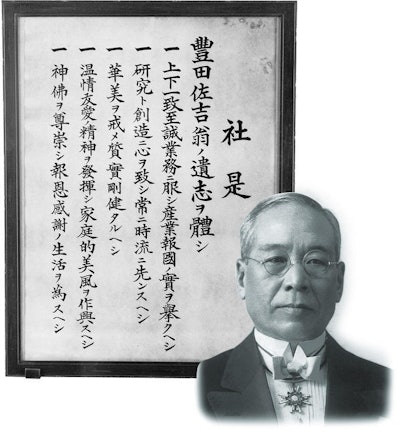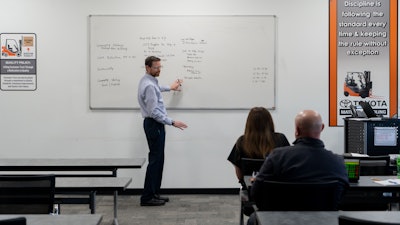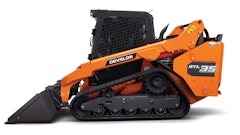
It’s been said that the greatest creation Thomas Edison ever invented was Menlo Park. This 34-acre parcel of land just outside of Newark, New Jersey of course became the home to the world’s first research and development laboratory where the ‘Wizard’ himself oversaw the near daily creation of modern miracles, including that undeniable symbol of creative thought: the light bulb.
While Edison was indeed a prolific innovator in his own right, many argue that his real genius was in his ability to manage and influence others. Some say the actual magic being performed within the walls of Menlo Park was Edison’s leadership. Over time, Edison grew increasingly motivated by the freedom earned through commercial success and how it allowed him to pursue more of his ideas that would positively impact the lives of his customers. He became less an inventor and more a leader responsible for recognizing and recruiting exceptional intelligence, marshalling the collective creativity of some of history’s greatest minds, aligning their efforts and unique talents toward a singular goal, and ultimately bringing his vision to life.
With so many obvious parallels in the lore of our company culture, it’s no wonder the contemporaries of our founder Sakichi Toyoda, dubbed him “Japan’s Thomas Edison.” Like Edison, Toyoda was innovative and let his inventions guide the way. He was responsible for the invention of the automatic loom which then led to the Toyota Motor Corporation. I find this transition fascinating, taking a company from textile looms to automotives, and beyond that—the industry’s most complete lineup of material handling products and solutions.  Sakichi Toyoda (1867-1930), founder of the Toyota Motor Corporation, laid the foundation for what would become one of the most renowned global brands.Toyota Material Handling USA
Sakichi Toyoda (1867-1930), founder of the Toyota Motor Corporation, laid the foundation for what would become one of the most renowned global brands.Toyota Material Handling USA
Whether you are currently managing a team of a dozen or less or leading a large corporate force of a 1,000+ people, the first key to effective organizational leadership is harnessing the remarkable power of inspiration.
Building Things is About Building People
"Strengthening Your Rental Business the Toyota Way" by Brett Wood, President & CEO, Toyota Material Handling North America, introduces the foundational principles and philosophies on which our company is built—what we call The Toyota Way. What is most unique to this set of principles is the focus on people. “Respect for people” forms the first of two pillars upon which The Toyota Way is built—the other being “Continuous Improvement” or “Kaizen.” This human-centric pillar is echoed repeatedly throughout the tenets of The Toyota Way. A core philosophy held by the company insists that “building things is about building people”.
The Toyota Way mandates that an organization creates value by developing its people. The management tenets encompass principles that charge leaders with equipping their people with the tools they need to continuously improve their work. In summary, team building is the cornerstone to achieving successful organizational leadership. Like the conductor of an orchestra, in your role as a leader in your organization, you are responsible for assembling the best team possible, and empowering their unique and diverse skillsets.
But just because you have all the instruments and musicians needed to perform the symphony—that doesn’t mean the music will be delivered as it’s been envisioned. You, the conductor, are responsible for bringing all the players together, orchestrating their delivery, and bring the music to life. This is achieved through masterful and effective communication of your vision to your team. Done properly, your team will be motivated, inspired and empowered to work in concert and bring your vision into reality.
More on Leadership
Listen to these podcast episodes on ForConstructionPros.com featuring advice and commentary on leadership.
The Evolution of Leadership - As the older generation begins to retire, we need to pass down the knowledge and expertise to the next generation. There has been a big shift of where the workforce is coming from and how they process the information given to them. Brad Humphrey and the subject matter experts discuss how to share your company culture and how to shift your thinking to better aid the future of leadership.
Leadership Training Tips - Brad Humphrey offers insights into how to identify potential leaders and how to train them once you have found them.
Leadership Skills You Can Improve - Construction industry owners and managers need to be leaders, and they need to constantly improve their leadership skills. Bart Gragg, Blue Collar University, discusses leadership skills in the construction industry and how those skills can be refined.
 Hopefully, you have a group of lifelong learners at your company who are always eager to learn new things. The next step is to align them with a good teacher, somebody who can help them grow and improve. In the process, your business will grow and your customers will be happier.Toyota Material Handling USA
Hopefully, you have a group of lifelong learners at your company who are always eager to learn new things. The next step is to align them with a good teacher, somebody who can help them grow and improve. In the process, your business will grow and your customers will be happier.Toyota Material Handling USA
Sharing a Mission & Vision
At Toyota, we define our primary purpose as contributing to the sustainable development of society. This is pointed to in Principle #1 of The Toyota Way: "Base your management decisions on a long-term philosophy, even at the expense of short-term financial goals." The philosophy under which Toyota associates operate harkens back to 5 precepts coined by Sakichi Toyoda:
- Always be faithful to your duties, thereby contributing to the company and to the overall good.
- Always be studious and creative, striving to stay ahead of the times.
- Always be practical and avoid frivolousness.
- Always strive to build a homelike atmosphere at work that is warm and friendly.
- Always have respect for spiritual matters, and remember to be grateful at all times.
Today, we still work to instill these same values in our associates. As time has tested and proven, people who share common values become a community, and when a community or company shares a mission and a clear vision, great things can happen. As you build and develop your team, you can build a solid foundation by clearly identifying and sharing your mission and vision.
Set the tone and communicate your expectations for your team by instilling enduring values that are important to you. In doing so, you create a system of accountability for yourself and your team.
Ethical Leadership
Edison’s unique ability to influence people was perhaps the foremost element to his particular genius. Through this influence he was able to achieve great things for society at large—and also himself. Ultimately, we must acknowledge that as leaders, the direction and culture of our organization is in our hands. Depending on who is at the helm, an organization can appear to be serving the interests of the organization and its stakeholders, or, without a strong ethical compass, can at times seem as if the focus is more on serving the interests of the leaders.
As leaders, it’s important that we create a continuous process flow to bring problems to the surface. Work processes are redesigned to eliminate muda (or waste) such as overproduction and waiting times through the kaizen process. At Toyota, we’ve built a culture where production can be stopped to identify out-of-standard conditions and build in quality.
Hansei represents our identity as a learning company that relies on our people and relentless reflection to continuously improve the company. We know from 100+ years of The Toyota Way that an organization creates value by developing its people first. As a leader, your success can hinge on your ability to establish and support a core set of organizational and personal ethical values that contribute to a strong culture. Strong cultures, like those at Toyota, ultimately translate to your success. Take a moment to consider your company’s culture, mission and values and your own leadership ethics. Can your team clearly articulate those values and mission?
Editor's Note: Find more inspiration and learning about The Toyota Way and the Toyota Production System at ToyotaForklift.com. Stay tuned for part 3 in this series on exceptional cultures and leadership, “What’s Your Why?,” exploring building value for your organization by creating engagement opportunities and events that sustain a people-focused culture.





























